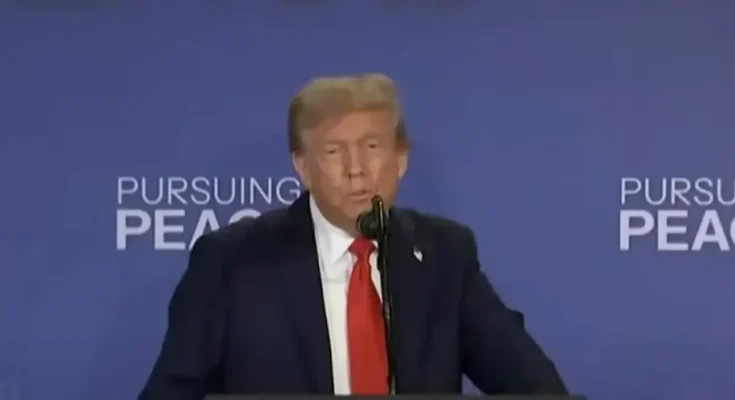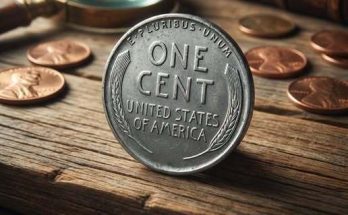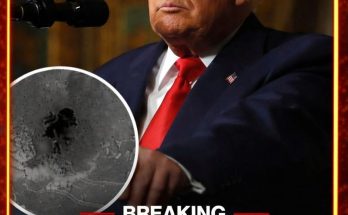Donald Trump has once again sent shockwaves through the global diplomatic stage, suggesting that Ukraine could bring its war with Russia to an end “almost immediately” — but only if President Volodymyr Zelensky makes two monumental concessions that would reshape the region’s future.
In a late-night post on his Truth Social account, the U.S. president declared that Ukraine should abandon its longstanding bid to join NATO and accept that Crimea, annexed illegally by Russia in 2014, will never return to Ukrainian control.
“President Zelenskyy of Ukraine can end the war with Russia almost immediately, if he wants to, or he can continue to fight,” Trump wrote. “Remember how it started. No getting back Obama given Crimea (12 years ago, without a shot being fired!), and NO GOING INTO NATO BY UKRAINE. Some things never change!!!”
The comments come on the eve of a high-stakes White House summit, where Zelensky and several European leaders are scheduled to meet Trump to discuss the next phase of the war, which has dragged into its fourth year with no clear resolution.
Trump struck a triumphant tone about hosting the talks, posting earlier: “Big day at the White House tomorrow. Never had so many European Leaders at one time. My great honor to host them!!!”
But the blunt ultimatum laid out in his late-night social media post has already sparked intense debate across Washington, Brussels, and Kyiv. For critics, it signals Trump’s willingness to cement Russia’s territorial gains while cutting off Ukraine’s pathway to NATO membership — a move that could weaken Western security architecture for years to come. For Trump, it is framed as pragmatism: a deal that could end bloodshed quickly, even if it leaves Ukraine without key aspirations.
Zelensky, who arrived in Washington Sunday night ahead of the talks, appeared to brace for a difficult conversation. Posting on X, he expressed gratitude for American support but warned against peace that comes at too steep a cost.
“I have already arrived in Washington, tomorrow I am meeting with President Trump. Tomorrow we are also speaking with European leaders. I am grateful to @POTUS for the invitation. We all share a strong desire to end this war quickly and reliably,” Zelensky wrote.
He also made clear that concessions on Crimea and Ukraine’s sovereignty were non-starters.
“And peace must be lasting. Not like it was years ago, when Ukraine was forced to give up Crimea and part of our East—part of Donbas—and Putin simply used it as a springboard for a new attack. Or when Ukraine was given so-called ‘security guarantees’ in 1994, but they didn’t work,” Zelensky continued. “Crimea should not have been given up then, just as Ukrainians did not give up Kyiv, Odesa, or Kharkiv after 2022. Ukrainians are fighting for their land, for their independence.”
The Ukrainian president noted his military’s recent advances in Donetsk and Sumy regions, insisting that his country remains capable of resisting Russian advances while holding the line in critical areas. “I am confident that we will defend Ukraine, effectively guarantee security, and that our people will always be grateful to President Trump, everyone in America, and every partner and ally for their support and invaluable assistance. Russia must end this war, which it itself started.”
The clash of perspectives sets the stage for one of the most consequential diplomatic encounters of the year. On Friday, just days before the Washington summit, Trump met Vladimir Putin in Alaska. That meeting, which stretched over three hours, produced no peace deal, but Putin did lay out conditions. Chief among them was a demand that Ukraine surrender the remaining quarter of Donetsk — a minerals-rich, Russian-speaking region that Moscow has long coveted.
In exchange, Putin suggested Russia might freeze hostilities in Kherson and Zaporizhzhia, two regions where his forces have struggled to make progress. According to reports, he told Trump this could create space for negotiations — though Kyiv has already rejected ceding the whole of Donetsk as unacceptable.
Speaking from Brussels after that meeting, Zelensky stressed that real negotiations could only begin on the current front line, not on Russia’s terms. “We need real negotiations, which means they can start where the front line is now. The contact line is the best line for talking,” he said.
He pointedly noted that Russia had failed for over a decade to fully conquer Donetsk, with Kyiv still holding the key cities of Sloviansk and Kramatorsk. Ukraine’s fortified positions, he argued, were proof of its resilience and a deterrent against Moscow’s ambitions to push deeper westward.
Meanwhile, U.S. Secretary of State Marco Rubio acknowledged the grim reality that any eventual settlement will require compromise. “What it’s going to take to stop the fighting, if we’re being honest and serious here, is both sides are going to have to give, and both sides should expect to get something from this,” Rubio told CBS News’ Face the Nation. “It’s very difficult because Ukraine obviously feels, you know, harmed, and rightfully so, because they were invaded. And the Russian side, because they feel like they got momentum in the battlefield.”
Rubio stopped short of endorsing Trump’s prescription of surrendering NATO hopes and Crimea, but his comments underscore the growing sense in Washington that the war’s endgame will likely involve difficult concessions.
For Zelensky, however, there is little room to manoeuvre. Ukraine’s constitution forbids the giving up of territory, and popular sentiment in the country remains firmly opposed to surrendering land for peace. Critics warn that conceding Donetsk or renouncing NATO membership would embolden Putin and risk future invasions.
The stakes could hardly be higher as Trump and Zelensky prepare to sit down in the Oval Office alongside European leaders. For Trump, it is a chance to showcase his deal-making instincts on the global stage. For Zelensky, it may be the toughest diplomatic test of his presidency, as he tries to balance gratitude for Western support with a refusal to sacrifice Ukraine’s sovereignty.
The outcome of the summit remains uncertain, but one thing is clear: Trump has laid down a stark vision for peace that could redraw Europe’s map — and Zelensky appears determined to resist it.



